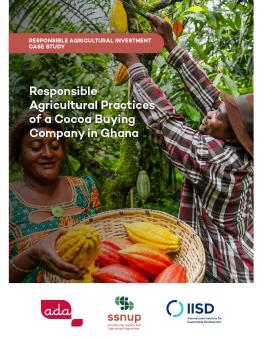
Responsible Agricultural Practices of a Cocoa Buying Company in Ghana
This case study analyzes the extent to which a small cocoa trader in Ghana complies with international standards for responsible investment in agriculture.
Responsible investment in and by agribusinesses—including crop producers, processors, and traders—can play a transformative role in driving innovation in agrifood systems, building market and supply chain linkages, and contributing to local economies and communities. These outcomes can be enhanced when agribusinesses align their policies, operations, and practices with the Committee on World Food Security’s Principles for Responsible Investment in Agriculture and Food Systems (CFS-RAI).
The agribusiness in this case study is part of the Smallholder Safety Net Up-scaling Programme (SSNUP), which brings together investors to promote sustainable, climate-smart farming practices and improve food security and living standards in developing countries. It is part of a series aimed at analyzing how well SSNUP investees perform and comply with international standards for responsible business conduct, such as the CFS-RAI.
The company is representative of small and medium-sized traders in the cocoa industry, which is a major export crop in West Africa. The industry faces an array of challenges—from climate-related issues to declining profitability and limited finance and resources. Traders must also grapple with restrictions established by the authorities, high competition with larger firms, and the need to devote considerable effort to establishing and maintaining relationships and trust with farmers, communities, enterprises, and other stakeholders in the value chain.
We measured the agribusiness’s compliance with principles for responsible investment across seven key dimensions. Overall, its level of compliance is acceptable, but significant action is required in areas in which it is weak. For example, the company is a small business in a very competitive environment. It, therefore, tends to focus on operational matters for survival, neglecting strategic matters and dealing with responsible business conduct in an ad hoc way.
Based on these findings, the case study concludes with extensive recommendations to the trader, its financial investors, the government, and other stakeholders. These include the need for more rigorous strategy building and formalization of processes, including those related to responsible agricultural investment, with supporting action proposed to financial investors and others.
Participating experts
You might also be interested in
LIMBUA Group Limited
This case study analyzes the extent to which a small agribusiness in Kenya complies with international standards for responsible investment in agriculture.
Mahembe Coffee
This case study analyzes the extent to which a small agribusiness in Rwanda complies with international standards for responsible investment in agriculture.
Sénégalaise des Filières Alimentaires
This case study analyzes the extent to which a small rice miller in Senegal complies with international standards for responsible investment in agriculture.
Tropic Coffee
This case study analyzes the extent to which a small coffee processor and trader in Rwanda complies with international standards for responsible investment in agriculture.